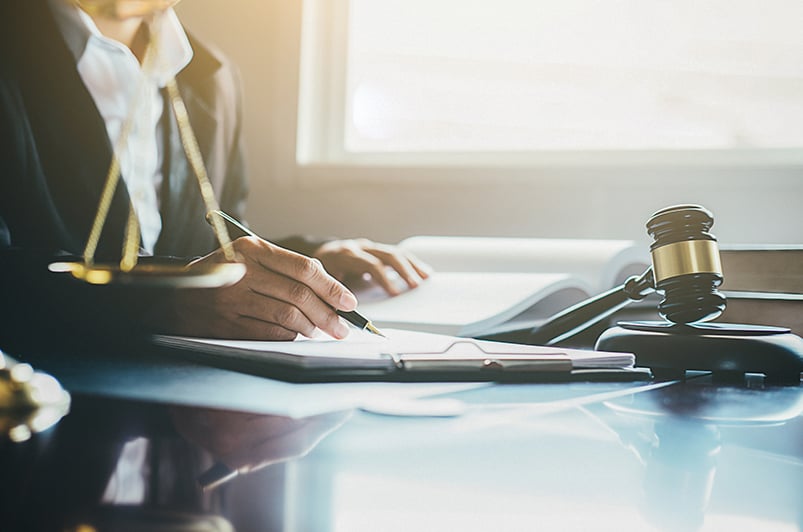Preparation is one of the most important strategies of any successful legal team. Researching the facts of the case and talking to key witnesses can give you valuable data that will make or break your trial
There are lots of tools available to you, and one of the most useful ones is a deposition. Depositions allow you to gather evidence first-hand from witnesses to form a better picture of the case.
In today’s article, we’ll discuss deposition in legal proceedings and why it's important in any litigation process.
What is a Deposition?
A deposition is a sworn statement given by a witness (called a deponent) outside of a formal court hearing. It’s used by either side during the discovery phase of litigation to gather evidence about the case.
In contrast to an official witness called into a trial, the deposition process is carried out without the supervision of the court. It’s often done with just the legal team of both sides, plus a person who receives the statement under oath.
The deposition definition is strictly confined to the United States justice system. Rules on conducting depositions differ from state to state and are governed by State Civil Procedure Rules.
Depositions, on their own, are usually inadmissible in court, except for a few circumstances. One is when the deponent’s testimony is against or damaging to their personal interest. The other is when there are no witnesses available during the day of trial.
How Depositions Work
There are two main types of depositions: oral and written.
- Oral Depositions: In this type, the deponent shares their testimony in person, with both legal teams present. A third-party individual records the testimony under oath. Lawyers from both sides can ask questions at any time, but they often cannot object to the questions made by other parties. These depositions are typically more interactive and allow for follow-up questions.
- Written Depositions: In a written deposition, both parties submit pre-arranged questions that they would like to ask the deponent. The questions and answers are recorded in writing, and no other follow-up questions can be asked. While this type is more convenient and doesn't require the presence of lawyers, it is also much more limiting.
When Does a Court Deposition Take Place?
Depositions are made during the discovery process. This is the fact-finding part of litigation, as all parties have the legal right to conduct their own investigations to build up the case.
During the discovery phase, both the prosecution and defense go into active research. The goal is to find facts and data that can guide a lawyer’s approach to the case. A deposition is simply a discovery tool in the legal team’s arsenal. Other strategies include interrogation, research, and subpoena of relevant documents.
Depositions are not needed in every case, and their merit depends on the approach and strategy of either the defendant or prosecutor. Cases that involve fundamental legal issues often don't require testimonies, and therefore the deposition is unnecessary.
What to Expect from a Legal Deposition
In a deposition, law professionals usually conduct the proceedings and not a judge. So, they often take place at a lawyer's office. These sessions can be as short as a few minutes or drawn out into multiple sessions. The more complicated and involved the deponent is, the longer the deposition proceeding can be.
Despite their potential length, depositions are straightforward. The opposing lawyer simply asks a series of questions. A reporter is usually present to record the deponent’s testimony word-for-word. In modern settings, however, this is often done with recording devices.
Either side’s lawyer cannot coach or advise the deponent during a deposition. Hence why, the lawyer may work with the deponent before the deposition, to anticipate possible questions and strategize answers.
Although depositions are not court hearings, deponents are still sworn under oath. Consequently, false statements are subject to criminal and civil penalties. Witnesses should treat depositions seriously. They must listen to the questions carefully and have to be mindful and truthful when answering them.
Why Are Depositions Important
Depositions are fundamental because they can set the tone for the remaining case proceedings. Lawyers from both parties can use it to evaluate the strength of the case and how to deal with potential issues during the trial.
Written depositions can also be used to compare the testimonies of witnesses later in court. While the deposition can’t be used in the court itself, it can be used to impeach testimony from the witness if what’s being said is different from the deposition on record.
Digital WarRoom
Depositions and other research processes like eDiscovery form an important foundation in building a successful case. With eDiscovery software from Digital WarRoom, you’ll have necessary legal information right at your fingertips. Contact us today to schedule a demo.
FAQs About Depositions
What is the difference between oral and written depositions?
Oral depositions involve in-person questioning and follow-up questions from the lawyers, while written depositions are restricted to pre-arranged questions and answers submitted in writing.
Can depositions be used in court?
Depositions are generally not admissible in court, but they can be used in certain situations, such as impeaching a witness’s testimony or if the deponent is unavailable during the trial.
Who conducts the deposition?
The deposition is usually conducted by the attorneys from both sides. A court reporter is typically present to record the testimony, and in some cases, digital recording devices may be used.
How do depositions help in the discovery phase?
Depositions are used in the discovery phase to gather firsthand evidence from witnesses, which can help shape a legal strategy and share insight into the strengths and weaknesses of the case.
What penalties are there for lying during a deposition?
Lying during a deposition is considered perjury, and the deponent can face both criminal and civil penalties if they provide false testimony.
-1.png?width=400&height=164&name=DWRLogoClassic%20-%20Copy%20(2)-1.png)









Comment On This Article